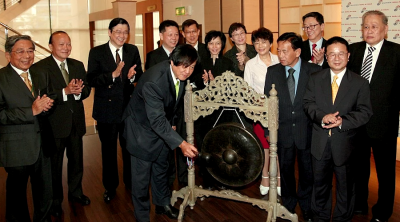
By Lim Sue Goan, Sin Chew Daily
The Pakatan Harapan government has been put to test over a large number of issues over the past 20 months, but none is as challenging as the 2019-nCoV outbreak.
There are two outbreak-related challenges that the government needs to overcome: to stop the transmission of infection within the community, and prevent the country's economy from heading to a recession.
I have no idea whether our leaders know which should be prioritized. For example, when the Wuhan virus has spread far across China and beyond, prime minister Tun Mahathir brought back his pet idea of PPSMI (teaching of science and maths in English) which is nothing novel and should be handed over to the cabinet and experts for deliberation. The government should focus on tackling the viral infection instead of wasting time unnecessarily on arguing about this.
We have already reported the first nCoV case involving a 42-year-old Malaysian man from Selangor who was in Singapore for a conference last month, and was only quarantined at Sungai Buloh Hospital ten days after returning to the country. How many people did he come into contact with during these two weeks? Is the health ministry able to track down all of them?
Prior to this there were two Chinese nationals confirmed with the viral infection roaming around freely in the country. The infected man from Tianjin visited a number of sightseeing places in Kota Kinabalu, while the infected woman from Wenzhou was in the country between January 20 and 27. Have the authorities managed to track down all the Malaysians they came into contact with?
Peninsular Malaysia is sandwiched between two badly affected neighboring countries. Thailand reported 25 confirmed cases as of Feb 4, including a locally transmitted case. Meanwhile in Singapore, 24 confirmed cases have been reported, including four out of six new cases who have not visited China at all.
Under such tremendous risks, it is imperative that the health ministry step up its screening procedures all all border checkpoints. Unfortunately the ministry said it could only take the body temperatures of Chinese nationals, given the fact there are some 200,000 people entering the country from the Johor causeway each day and we simply do not have enough thermal scanners to screen everyone. There is obviously a huge loophole here!
Currently we are only imposing entry bans on Chinese nationals from Wuhan and the province of Hubei. Perhaps we should take cue from what Singapore does: banning the entry of all foreigners irrespective of nationality who have traveled to Mainland China over the past 14 days.
The health ministry should put in more medical resources to stem the spread of the virus within the community. The better the preventive measures, the more Malaysians have faith in the government and the less panic they will get.
Additionally, the government should also ready itself for the advent of an imminent economic crisis. Judging from the current circumstances, its seems that the outbreak will not be fully contained soon, meaning there is a strong likelihood the global economy will slip into a recession.
Malaysia's economy is heavily dependent on China, which is one of our most important trading partners. With more and more Chinese cities put under lockdown, manufacturing and transportation activities will invariably be disrupted. A stagnant Chinese economy will trigger a domino's effect among many developing countries, including trade-dependent Malaysia.
Some 5,000 Chinese tour groups have canceled their trips to Malaysia as a consequence of the travel bans enacted by Beijing authorities. It has been estimated that we will stand to lose some RM440 million in tourist earnings between late January and March. The local tourism industry will see massive layoffs if the government does nothing to help.
Tourism, arts and culture minister Mohammadin Ketapi says his ministry will look for alternative sources to make up for the drastic drop in Chinese arrivals. Nevertheless, the industry has little faith in the ministry's efficiency and competency, and is generally pessimistic that the 30 million tourist arrival goal for Visit Malaysia Year could be achieved.
In the meantime, the coronavirus is also battering the local consumer sentiment, defeating the government's RM30 e-Tunai Rakyat initiative. It is therefore essential for the government to come up with new stimulus packages and subsidies to boost the local retail industry.
Sliding palm oil prices will take a toll on the local economy, as international oil prices go into a bearish phase and could very well fall below the US$50 per barrel mark any time. This will invariably thin out the Treasury's revenue.
Major infrastructural projects involving significant Chinese investments such as the East Coast Rail Link and Bandar Malaysia projects will likely be delayed.
Among the sectors which will take the brunt of the viral outbreak are tourism, aviation, transportation, education and construction. As such, the National Economic Action Council headed by the prime minister himself must immediately convene a meeting of representatives from all involved industries to deliberate on effective economic stimulus packages that will help the operators, instead of just observing and doing nothing else.
It will be too late for the government to start doing something only after companies begin to lay off their workers. The PH government will suffer a new confidence crisis if the coronavirus outbreak has taken a toll on the national economy, triggering widespread frustration among the public.
While 2019 novel coronavirus is posing a severe challenge, it nevertheless also offers a unique opportunity for the government to recoup its lost support. We have yet to see whether a PH government badly lacking in cohesiveness and distracted by the power transition issue will be able to defuse the coronavirus crisis.
ADVERTISEMENT
ADVERTISEMENT


































